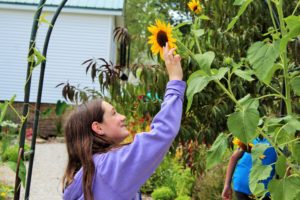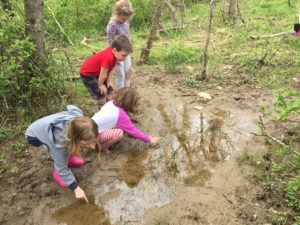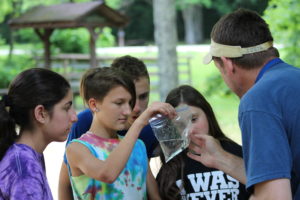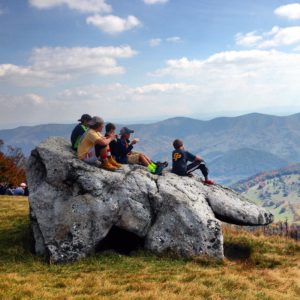By JoEllen Zacks
One of the newest trends in education is also one of the oldest.
Nature-based learning is beginning to take root in West Virginia as a growing number of schools take the classroom outdoors to give students hands-on learning opportunities and context to their academic work.
They’re rediscovering a truth espoused by the Greek philosophers, education reformers such as Thomas Dewey and Maria Montessori and poets like William Wordsworth and Robert Frost: nature itself can be the best teacher.

MMMS students at their Hudson Farm Land Lab.
“Nature-based outdoor learning, experiential environmental education, environmental education—all of these things, while different in some ways, are at their core the same,” says Bridgett Steveson, lead guide of Mountaineer Montessori Middle School (MMMS) in Charleston. “They all strive to bring students outside to experience the environment firsthand. What is important is the connection the student has with the environment, as this is what brings learning to life. In all of my years of teaching, I have never met a kid who said he would rather be in the classroom learning over learning by doing.”
Outdoor classrooms and other nature-based learning experiences are not only enjoyable for students but contribute to improved academic performances. A 2005 study by the American Institutes for Research found that students in outdoor science programs boosted their testing scores by 27 percent, with teachers reporting significant gains in self-esteem, conflict resolution, relationships with peers, problem-solving skills, motivation and positive behavior. These lessons seem to stick because they give context based on experience.
“It doesn’t matter if the experience was today, yesterday or years ago,” says Steveson. “There is something special about a concept being covered in class that triggers the memory of an experience. It brings to life the whole picture of why we care enough to learn something. Not only that, but it deepens understanding and makes learning fun and purposeful.”
Creative Connections
A land lab collaboration with Hudson Farms is the latest expansion to the MMMS curriculum initiated by Steveson.
“One of the benefits to farming in West Virginia is that everyone knows everyone else,” she says. “What started as a quest to find a place to take my students on a field trip has turned into the opportunity to truly integrate our students’ units of study into the outdoor environment. Through my connection with Hudson Farms, I have met and worked with people from the West Virginia State University extension office, West Virginia Food & Farm Coalition, SAGE gardens and many other local farming operations. I have also been involved in building high tunnels at several elementary schools in the area. It is these connections that have helped to establish and strengthen my own school’s middle school program.”

Students interacting with nature at Riverside Nature School.
The farm the class is working on is driving all of its scientific units of study, which allows Steveson to fully integrate what students are learning in the classroom with practical, real-life uses and needs for this information.
“With the integration of studies, learning is internalized, and students gain a better understanding of the things they are learning,” she says. “When this happens, you start to see an increase in creativity, problem-solving and thinking through things independently. Ultimately, a school has stronger, more motivated students.”
Moving the classroom outdoors can also address significant developmental issues that arise when children spend most of their days indoors with a smart phone or tablet in their hands.
“Nature-deficit disorder describes the human costs of alienation from nature, among them diminished use of the senses, attention difficulties and higher rates of physical and emotional illness,” says Richard Louv, author of “Last Child in the Woods: Saving Our Children from Nature-Deficit Disorder.” “This disorder can be detected in individuals, families and communities.”
An Outdoor Education
Bringing children into contact with nature from the start was the impetus for the creation of a new early childhood education experience in the Eastern Panhandle. The Riverside Nature School was founded in 2015 by Emma Huvos after she left a teaching position at a public charter school in Washington, D.C. and moved to her grandparents’ old dairy farm in West Virginia.
“I knew I wanted to continue working with children, but I was feeling disillusioned with a lot of the trends I was observing in early childhood education,” says Huvos. “I was especially concerned by the shift toward high-pressure, hyper-academic preschool programs, as well as by the huge decline in the amount of time children today spend outdoors. As I started researching alternatives, I stumbled across the concept of forest kindergarten, which has been widely embraced in Europe for quite a while. Designed for children ages 3-6, forest kindergarten programs are held almost fully outdoors, and the learning is student-driven, with the adults serving as facilitators rather than instructors. As someone who loves to spend time outdoors, I was immediately hooked, and I knew our property here in Jefferson County would be the perfect setting for such a program.”
The Riverside Nature School now offers a range of programs, including a primary education component for children ages 3-6. Students spend the majority of their time outdoors—year-round, rain or shine— exploring the woods, fields and gardens of the 80-acre property.

Ben Lowman, WVDEP Division of Mining and Reclamation, with MMMS students.
Within minutes of getting outside each morning, children as young as 3 become engaged in tasks of their own choosing and remain deeply focused for extended lengths of time with no outside prompting, according to Huvos. While some take a few days to build up their outdoor stamina, children quickly adapt and start to grow and thrive in the forest school environment.
“The impact is especially profound for students who may have struggled in more traditional early childhood settings,” says Huvos. “For example, one student who had previously been diagnosed with sensory processing disorder and hated getting his hands dirty was soon climbing trees, picking up bugs and even sitting in mud puddles. There is none of the direct instruction typical in most early childhood classrooms, but there is no shortage of learning either. Leaves are collected and exchanged as currency, helping to hone math skills, and sidewalk chalk is used to create signs on scraps of wood, allowing the children to practice their writing skills in a meaningful context. Building ramps and bridges allows the children to explore engineering and physics while simultaneously developing their gross motor skills by carrying heavy objects and balancing on slippery or uneven surfaces.”
While this approach to early childhood education is widely accepted in places like Denmark, Germany and the United Kingdom, it’s still a relatively new concept here in the U.S., according to Huvos, but she is not surprised it is starting to gain traction.
“In addition to providing students with the self-regulation and problem-solving skills crucial for long-term academic achievement, this model offers a myriad of other benefits, including greater independence and self-confidence, improved gross and fine motor skills, lower rates of behavioral problems and attention deficit disorders, better physical and mental health and a deep and personal connection with the natural world,” she says.
The Riverside Nature School now has a waiting list—attracting students from Maryland and Virginia as well as West Virginia—and big plans for planting the seeds of outdoor learning throughout the state and beyond. Huvos set up a website and is establishing partnerships to make outdoor learning programs more accessible.
“My goal is to see students in all early childhood programs—whether public, private or in-home—getting at least one morning per week of outdoor nature school,” she says.
A Wealth of Resources

Experience learning connects student with the beauty of West Virginia.
Educators believe connecting students with nature does not necessarily require a major curriculum change or large financial investment.
“Taking your class outdoors does not have to involve much, especially here in West Virginia,” says Steveson. “We are blessed here to have many wooded areas, streams, rivers, et cetera, right outside the classroom doors. Even if you do not have a pristine environment, there is so much you can learn and take indoors. If you are studying insects, go outside and see what you can find. If you are studying man’s impact on the environment, just step outside. The more you can bring real-life context to what you are studying, the better.”
There are many resources available to educators looking to incorporate environmental learning. School gardens and agriculture programs offer a natural foundation for taking learning outside. Programs offered through the West Virginia Department of Environmental Protection (WVDEP) and other federal, state and local agencies as well as nonprofit organizations can connect teachers with no-cost expertise, materials and lessons plans. Off-site opportunities are also available to give students a more in-depth, residential environmental experience.
More than 2,000 students participate in programs at the Experience Learning Center at Spruce Knob each year. Formerly a part of The Mountain Institute, Experience Learning, Inc. offers several different programs for K-12 students that go beyond the classroom through a combination of cooperative living, hands-on science activities and self-sufficiency.
Experience Learning also sponsors an Appalachian Watershed and Stream Monitoring Program, a citizen-science program that uses a hands-on science investigation to engage children in their local community. Students collect and analyze data revolving around the biological, chemical and physical attributes of a stream. This information is then shared with the WVDEP and uploaded to the Save Our Streams volunteer assessment database. These stream assessments occur at the Spruce Knob Mountain Center and/or a local stream near their school. Professional development workshops for educators and summer camp programs are also available.
“Students are engaged on a more meaningful level when they are active in their learning,” says Vicki Fenwick-Judy, executive director of Experience Learning, Inc. “When a group of students works together to plan a route to the highest point in West Virginia, they are using their hands and minds together. They are learning cooperation, communication, teamwork and content. The students are up and moving around, they’re exploring and using their bodies as well as their minds while they also enjoy opportunities to climb mountains, traverse caves and navigate through West Virginia’s beautiful and diverse forests. We are creating authentic experiences where students can be challenged and successful. They can use their individual strengths to contribute to a community, and they can demonstrate competencies in new ways. When you are working directly with the kids, it’s the aha moments and the achievements made. It’s also great to see students spend time outdoors.”
Each school visit is tailored to meet teachers’ and schools’ objectives. Before each trip, Fenwick-Judy and others work directly with the teacher to ensure the focus of the experience will match their expectations. Some schools like to focus on science content while other schools put more emphasis on the interpersonal skills developed while participating in such a program.
Growing Curious Children
Like Steveson and Huvos, Fenwick-Judy sees big room for growth of nature based learning in West Virginia.
“I see our program growing to reach more students—that’s always a goal,” she says. “I also see us building the capacity to work more deeply with schools. We want the experience to be more than just a one-time experience. When they return to their schools or communities, we want them to make connections from their experience with us to their everyday lives.”
Experience Learning’s expansion plans include the roll out of a pilot professional development program this fall that will instruct teachers on how to use their own backyards and communities as a lens for learning, as well as a new leadership program within its Mountain Stewards summer camp. The organization has also established a new campus, Sweetwater Farm in eastern Pendleton County, where an agricultural program will be introduced.
“We constantly revisit our curriculum and activities to make sure they are based on educational research,” says Fenwick-Judy.
In addition to the academic and developmental advantages, West Virginia’s breathtaking beauty itself might be the most compelling argument for incorporating nature-based learning into its schools.
In the words of Maria Montessori, “There is no description, no image in any book that is capable of replacing the sight of real trees and all the life to be found around them in a real forest. Something emanates from those trees which speaks to the soul, something no book, no museum is capable of giving.”
 About the Author
About the Author
JoEllen Zacks is a Charleston-based lawyer, writer and education advocate. A former senior director of strategic communication at the American Bar Association in Chicago and senior vice president of the Charleston Area Alliance, she helps put ideas and organizations on the map through smart messaging, policy and management strategies.




1 Comment
Bravo – excellent article! West Virginia has one of the most diverse “nature classroom” in America with biodiversity of flora and fauna, rich cultural history overlaid, adventure options to make exciting — and accessible to one-third of the population. A lot of growth potential here. Well done article. –